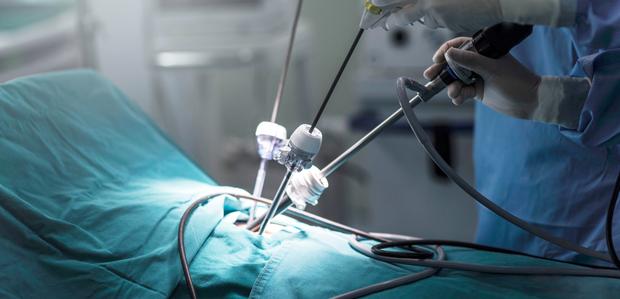Department of Surgical Gastroenterology

Surgical Gastroenterology is a specialized branch of surgery that focuses on the surgical management of diseases affecting the gastrointestinal (GI) tract, which includes the esophagus, stomach, small intestine, large intestine (colon and rectum), liver, gallbladder, and pancreas. Surgeons who specialize in this field are known as Surgical Gastroenterologists.
Patients with complex gastrointestinal conditions that require surgical intervention are typically referred to the Department of Surgical Gastroenterology. The goal is to provide specialized and comprehensive care to improve patient outcomes and quality of life. Choose Gleneagles Hospital, the top surgical gastroenterology hospital in Mumbai, to get the top-notch care and service.
Diagnosis
The diagnosis in the field of Surgical Gastroenterology involves a thorough evaluation of patients presenting with gastrointestinal symptoms or conditions that may require surgical intervention. Here are the key steps involved in the diagnosis within Surgical Gastroenterology.
- Clinical Evaluation
The process begins with a detailed clinical assessment of the patient, which includes a comprehensive medical history, review of symptoms, and a physical examination. The surgeon may inquire about symptoms such as abdominal pain, changes in bowel habits, weight loss, and other relevant details. - Diagnostic Imaging
Various imaging techniques are employed to visualize the structures of the gastrointestinal tract. Common diagnostic imaging methods include:
Computed Tomography (CT) Scan: Used to assess abdominal and pelvic organs.
Magnetic Resonance Imaging (MRI): Provides detailed images of soft tissues, including the liver, pancreas, and bile ducts.
Ultrasound: Helpful for examining the liver, gallbladder, and other abdominal organs.
Endoscopic Ultrasound (EUS): Combines endoscopy with ultrasound to evaluate the GI tract and adjacent structures. - Endoscopic Procedures
Endoscopy is a key diagnostic tool in Surgical Gastroenterology. It involves the use of a flexible tube with a light and camera (endoscope) to visualize the interior of the digestive tract. Common endoscopic procedures include:
Esophagogastroduodenoscopy (EGD): Examines the esophagus, stomach, and duodenum.
Colonoscopy: Evaluates the entire colon and rectum.
Endoscopic Retrograde Cholangiopancreatography (ERCP): Assesses the bile ducts and pancreatic duct.
Endoscopic Ultrasound (EUS): Not only diagnostic but also provides information for staging tumors. - Laboratory Tests
Blood tests and other laboratory investigations may be conducted to assess liver function, pancreatic enzymes, and other markers that can provide insights into the underlying gastrointestinal conditions. - Biopsy
Tissue samples (biopsies) may be obtained during endoscopic procedures or surgeries to analyze the cellular composition of lesions or tumors. This is particularly important for diagnosing cancer and determining the appropriate treatment approach. - Functional Tests
In certain cases, functional tests may be conducted to assess the performance of specific organs within the gastrointestinal system. Examples include gastric emptying studies or motility tests for the esophagus. - Specialized Testing
Depending on the suspected condition, specialized tests may be ordered. For instance, tests for Helicobacter pylori infection, genetic testing for hereditary gastrointestinal conditions, or tests for autoimmune disorders may be considered. - Multidisciplinary Consultation
Surgical Gastroenterologists often work closely with medical gastroenterologists, oncologists, radiologists, and pathologists in a multidisciplinary approach to diagnosis and treatment planning.
The Department of Surgical Gastroenterology is a specialized unit that focuses on the surgical management of diseases related to the gastrointestinal (GI) tract. This department is staffed by Surgical Gastroenterologists, who are surgeons with specialized training and expertise in performing surgical procedures for conditions affecting the esophagus, stomach, small intestine, large intestine (colon and rectum), liver, gallbladder, and pancreas.
Our Doctors
View all
Dr Prashanth Rao
Director and Senior Consultant
MBBS, MS, FRCS (Ed), DNB MNAMS, Diploma in Laparoscopic Surgery (Fr.), FIAGES, FALS (Hon), FICS (USA)
Best Gastroenterologists in Mumbai
Our department at Gleneagles Hospital has the best Gastroenterologists in Mumbai who are board-certified and are experts in advanced Endoscopic procedures. Our doctors are pioneers in Therapeutic and Third-space Endoscopy. We have well-trained and qualified Gastroenterologists and residents around the clock. Our outstanding team of nursing, technical and support staff strive to ensure the best possible treatment outcomes as well as provide an unparalleled experience for all digestive ailments. We value time, quickly recognise the problem and reconnect patients to good health. We treat patients with empathy, and compassion and to your satisfaction. Our doctors look for safety in addition to cost-effectiveness when prescribing any medications. We strive to be the best and most holistic Gastroenterology centre, thereby creating a benchmark of our own.
- What is Single Port Surgery?
Single-port surgery is a minimally invasive technique whereby one small incision is used for performing gastrointestinal procedures, thereby reducing scarring and time to recovery.
- What is the role of research at Gleneagles Hospital?
There is continuous clinical research at Gleneagles Hospital that aims to enhance diagnostic accuracy and the advancement of surgical techniques in order to provide patients with the latest and most effective treatments, making us a top Surgical Gastroenterology Hospital in Mumbai.
- Which kinds of surgeries are provided under surgical gastroenterology?
At our Surgical Gastroenterology Hospital in Mumbai we offer the surgeries that include colorectal cancer, gallbladder disorders, hernias, obesity, liver transplants, and minimally invasive pancreatic surgeries.
- What are the advantages of robotic-assisted surgeries in gastroenterology?
The robotic-assisted surgeries provide greater precision, smaller incisions, faster recovery, and less pain for patients who undergo complex gastrointestinal procedures.
FAQ
Why Choose Us
-
PATIENT EXPERIENCE
Your care and comfort are our top priorities. We ensure that the patients are well informed prior to every step we take for their benefit and that their queries are effectively answered.
-
LATEST TECHNOLOGIES
The Gleneagles Hospital's team stays up to date on the advancements in medical procedures and technologies. Experience the Future Healthcare Technologies now at Gleneagles Hospital.
-
PROVIDING QUALITY CARE
Strengthening lives through compassionate care, innovative therapies and relentless efforts. It reflects in the DNA of our passionate team of doctors and dedicated clinical staff.












